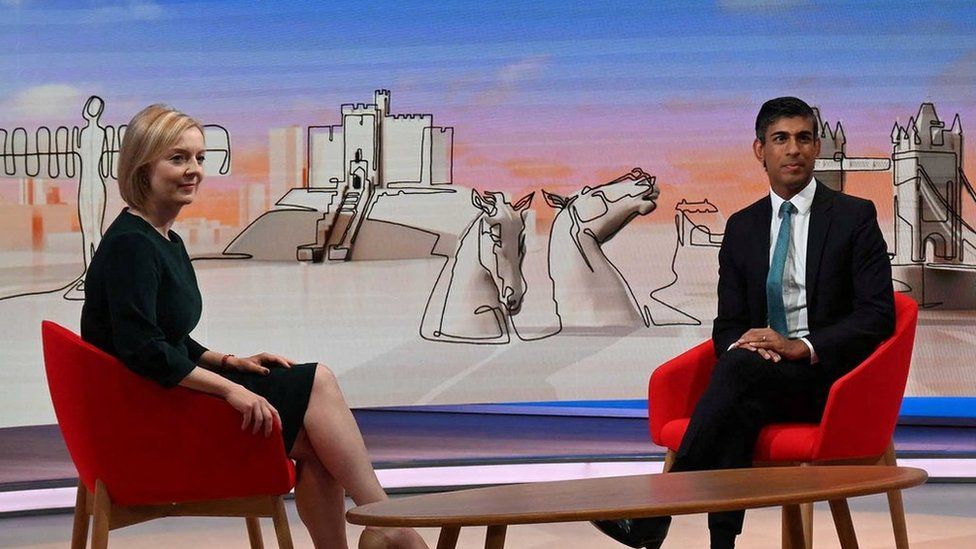ARTICLE AD BOX
By Reality Check team
BBC News

The two remaining candidates to be prime minister were on the BBC's Sunday with Laura Kuenssberg, the day before we find out which of them will get the top job.
They were challenged about what support they'd give people facing high energy bills and how they'd find the billions of pounds to do this.
Here are some of their claims.
'Last time we cut corporation tax we saw the revenues increase' - Liz Truss
Corporation tax - a tax on company profits - is due to rise from 19% to 25% next April - a plan devised by former chancellor Rishi Sunak.
Liz Truss wants to cancel this increase. Her idea is that keeping taxes lower increases economic growth, which means the amount of money the government gets from the tax increases even though the rate is lower.
But the economic think-tank the Institute for Fiscal Studies (IFS) has warned against this assumption saying: "The effect would certainly not be big enough for the tax cut to pay for itself".
The government estimates that cancelling the rise would cost £17bn a year, although that doesn't take into account any increased investment or companies deciding not to relocate or spend money on tax planning.
The IFS said that the fact that tax revenues had risen in 2019 despite lower headline rates of corporation tax (it was reduced to 19% in 2017) did not provide evidence that cutting rates automatically raised more revenues.
It said there were other factors involved, including the UK's continuing recovery from the financial crisis.
And economic growth remained relatively low, despite the cut in corporation tax rates.
'We have actually protection for these people' - Rishi Sunak
Mr Sunak was asked whether people who could not pay their energy bills should be cut off.
He's right that if energy companies want to disconnect the supply of a customer who has not paid a bill after 28 days there are restrictions on that.
They would need to give the customer a chance to clear their bill through a payment plan and they may need to apply to a court for a warrant to enter the property to disconnect the supply.
There are also rules preventing certain vulnerable people being disconnected - such as people of state pension age who live alone or people who live with children.
According to figures from the regulator Ofgem, 21 households had their supply disconnected last year. Suppliers tend to move customers to prepayment meters instead.
'What we shouldn't be doing is putting solar panels on productive agricultural land' - Liz Truss
Ms Truss doubled down on her comments during the leadership campaign that farmers' fields shouldn't be "full of solar panels".
It's not clear how big an issue this really is, although several Conservative MPs have raised it.
Solar farms in the UK currently account for 0.08% of total land use. We've asked the National Farmers' Union (NFU) how much of this is agricultural land.
Under the government's net zero plans, solar farms could rise to an estimated 0.6% of all land use. Solar Energy UK says this would be less than the amount of land currently used for golf courses.
There are five categories of agricultural land, ranked by quality.
Currently, the guidance for local authorities is that solar farms should be built on "moderate quality" land, meaning their impact on food production would be limited.
The National Farmers' Union (NFU), which calls solar projects, "a good diversification option" for its members says: "The NFU's preference is that solar farm development is located on lower quality agricultural land, avoiding the most productive and versatile soils."
'The last time I stood up and did a budget, actually the public finances were on a trajectory back to sustainability' - Rishi Sunak
Mr Sunak delivered his last budget on 23 March, which was three and a half months before he resigned as chancellor.
At the time, the Office for Budget Responsibility (OBR), which makes independent forecasts for the government based on its policies, was already warning that Russia's invasion of Ukraine and the accompanying rises in energy prices "will weigh heavily on a UK economy that has only just recovered its pre-pandemic level".
The OBR gave him a 58% chance of meeting his target of having government debt falling as a proportion of the size of the economy by 2024-25.
It gave him a 66% chance of achieving a balanced current budget by 2024-25, which would mean the government only borrowing money to invest.
Clearly, the public finances have deteriorated considerably since then, and Mr Sunak announced another £15bn of measures to ease the cost of living crisis two months after the Budget.
For the month of May, when Mr Sunak was still chancellor, the OBR said that government borrowing had been more than 20% higher than it had expected. That was partly due to a big increase in the government's interest payments due to higher inflation.

 2 years ago
35
2 years ago
35








 English (US) ·
English (US) ·